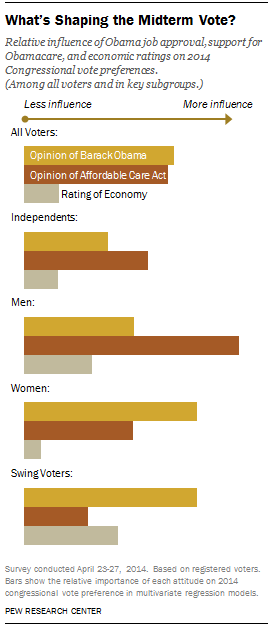 Since the Affordable Care Act was passed nearly four years ago, a plurality of Americans have disapproved of it. Since the onset of the Great Recession six years ago, more than 80% of Americans have rated economic conditions as only fair or poor. And since winning a second term, Barack Obama’s approval score has mostly been in the mid-40s or lower. One or more of these attitudes will have to move in a clearly positive direction for the Democratic Party to avoid a drubbing in the congressional elections, according to a new analysis of voter opinion.
Since the Affordable Care Act was passed nearly four years ago, a plurality of Americans have disapproved of it. Since the onset of the Great Recession six years ago, more than 80% of Americans have rated economic conditions as only fair or poor. And since winning a second term, Barack Obama’s approval score has mostly been in the mid-40s or lower. One or more of these attitudes will have to move in a clearly positive direction for the Democratic Party to avoid a drubbing in the congressional elections, according to a new analysis of voter opinion.
So far the indications for that are not so good. Recent months have shown signs of economic progress and indications that the Affordable Care Act has begun to achieve its goals. But there is little indication that the unemployment rate’s falling to 6.3%, the Dow Jones average soaring to a new high and the ACA signing up 8 million people, (including many young people,) had any effect on attitudes about these two key issues.
A late April Pew Research/USA Today poll found only 17% of the public rating national economic conditions as excellent or good, which is not materially different than such ratings have been since February 2008. Similarly, the poll found the percentage disapproving of the health law (55%) is as high as it ever has been in the four-year history of the law. Just 41% approve of it. Not surprisingly, on this issue and others, views about Obama remain quite negative: 44% approve, 50% disapprove of his job performance.
A special analysis of a recent Pew Research Center/USA Today survey suggests that these three factors are strong correlates of congressional preferences in 2014. Taken together, opinions about the national economy, the Affordable Care Act, and the president’s job performance accurately predict congressional voting intentions. For example, in the most recent Pew Research survey, these three pieces of information are enough to identify 86% of registered voters who plan to vote for the Republican candidate in their district.
The poll from which these analyses were made found 47% of registered voters supporting or leaning to Republican candidates in their district compared to 43% favoring the Democratic candidates. This is a better showing for the GOP than in other surveys over the past six months. Odds are, if this poll were based on likely voters rather than all registered voters, the Republicans would hold a significant lead.
The survey also showed 26% of voters saying they will be casting a vote against the president in November, which is roughly the same percentage who said they were doing so in 2010, when his party’s poor showing cost it control of the House of Representatives. The poll identified jobs as the most important issue, followed by health care. In that regard, the public has come to the view that the president’s signature legislation is probably “here to stay,” even as it remains widely unpopular.
Among all registered voters, Obama approval and opinion of the Affordable Care Act appear about equally influential in shaping voter opinion, and are somewhat more important than economic attitudes among all voters. But the most important factor varies by key voting blocs. For independents, attitudes toward the health care law, which they largely disapprove of, is more important than opinion about Obama or the condition of the nation’s economy. Similarly, the new health care law is most important for men, while opinions about Obama are more significant vote drivers among women.
Opinions about the president are also more crucial to about 20% of voters who admit they are still on the fence about which party’s candidate to cast a ballot for.


